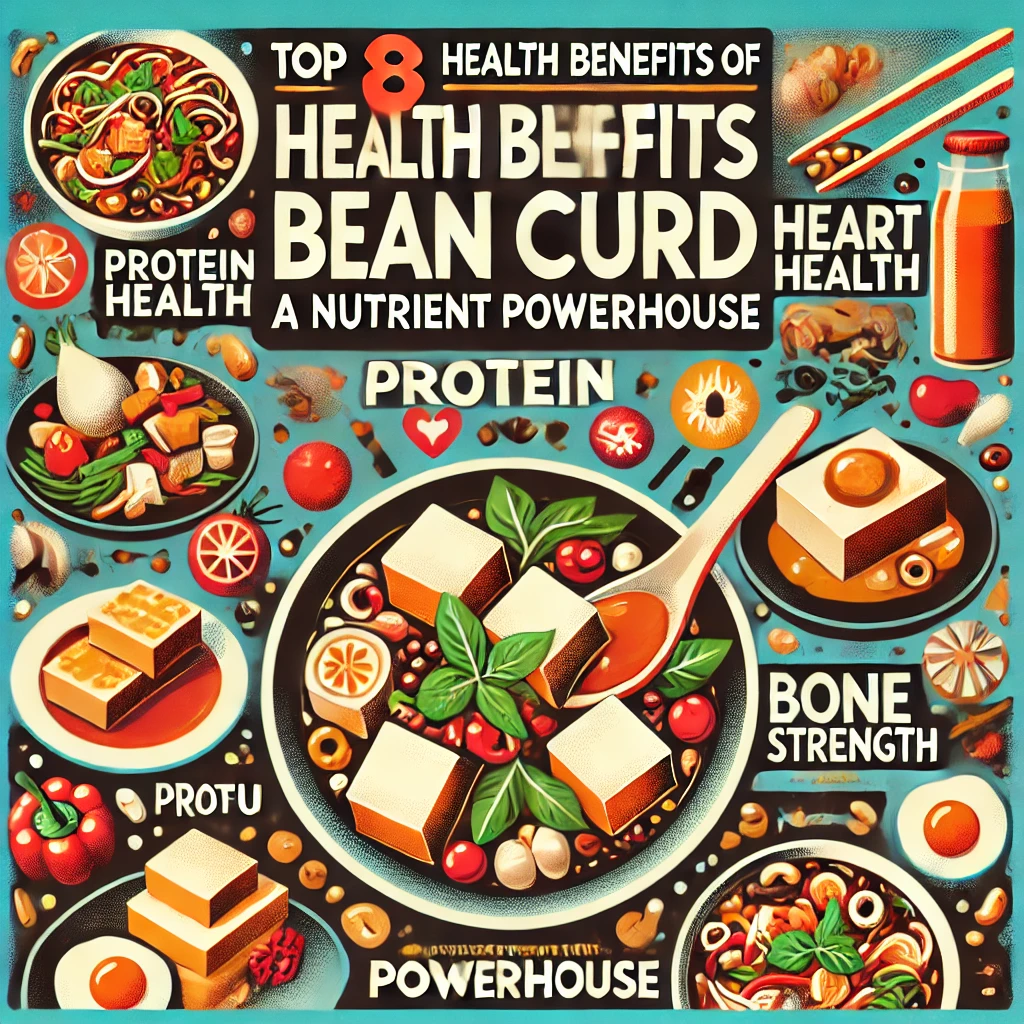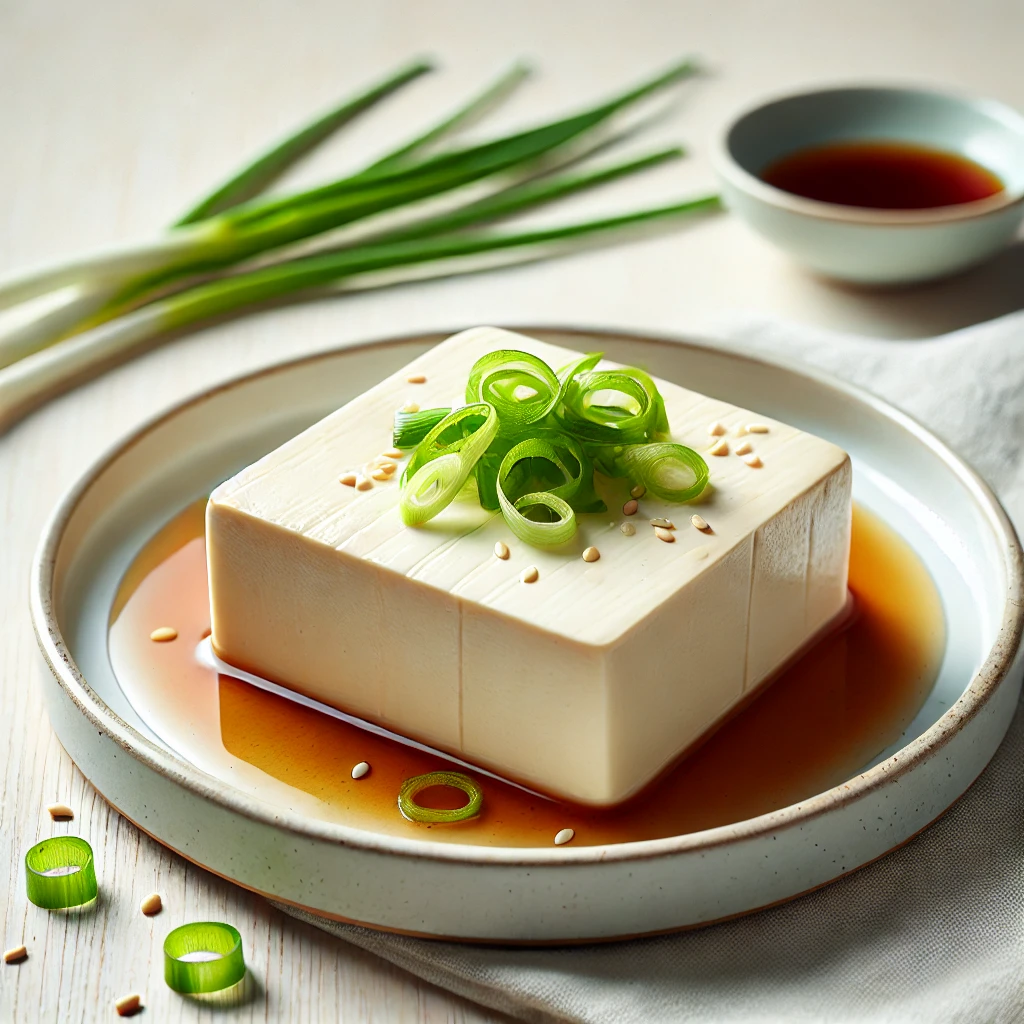Bean curd, commonly known as tofu, has gained immense popularity worldwide due to its wide range of health benefits, nutritional value, and versatility in various culinary applications. Originally a staple in East Asian diets, tofu has become a favorite for vegetarians, vegans, and health-conscious individuals across the globe. Made from soybeans, bean curd is a nutrient-dense food that offers numerous benefits, making it a valuable addition to a balanced diet.

1. Rich in High-Quality Plant-Based Protein
One of the standout benefits of bean curd is its status as an excellent source of high-quality plant-based protein. For those who follow a vegetarian or vegan diet, tofu serves as an essential source of complete protein, containing all nine essential amino acids that the body cannot produce on its own.
A typical 100-gram serving of tofu provides approximately 8 grams of protein, making it comparable to animal-based proteins such as chicken or beef. Protein is crucial for a wide variety of bodily functions, including muscle repair, enzyme production, and the maintenance of healthy tissues. Incorporating tofu into your diet ensures you receive sufficient protein, especially for those looking to reduce or eliminate meat consumption.
Moreover, unlike many plant-based proteins that lack one or more essential amino acids, tofu provides all of them, making it a complete protein source. This makes it particularly beneficial for those who are physically active or looking to build muscle mass.
2. Supports Heart Health by Lowering Cholesterol
Heart disease is one of the leading causes of death worldwide, but dietary changes can significantly reduce the risk. Bean curd is a heart-healthy food that helps manage cholesterol levels, thus supporting cardiovascular health. Tofu is naturally low in saturated fat and contains no cholesterol, making it an ideal choice for people aiming to protect their heart health.
Moreover, tofu is rich in isoflavones, a type of plant compound found in soybeans. Studies have shown that these isoflavones may help reduce levels of LDL cholesterol (the “bad” cholesterol) in the blood. High levels of LDL cholesterol are associated with an increased risk of heart disease and stroke, so including tofu in your diet can be an effective way to manage these risks.
Research also suggests that regular consumption of tofu and other soy-based foods may improve arterial function and enhance blood flow, further contributing to overall cardiovascular wellness.
3. Aiding Weight Management and Satiety
For those aiming to lose weight or maintain a healthy weight, bean curd is an excellent addition to your meal plan. Tofu is low in calories but high in protein, which can help increase feelings of fullness and reduce overall calorie intake. A 100-gram serving of tofu contains approximately 76 calories, making it a nutrient-dense yet low-calorie food that helps you feel satisfied without overeating.
Protein-rich foods like tofu promote satiety, which can help prevent overeating and cravings for unhealthy snacks. Tofu’s high water and fiber content also contribute to its filling nature, helping to regulate appetite and support healthy digestion.
Incorporating tofu into meals can help reduce the consumption of higher-calorie, processed foods while still providing your body with the nutrients it needs to thrive.
4. Strengthens Bones with Calcium and Magnesium
Maintaining strong bones is essential for long-term health, and bean curd can play a significant role in supporting bone density. Many tofu varieties are fortified with calcium, an essential mineral for bone health. Calcium helps prevent the onset of osteoporosis, a condition where bones become weak and brittle, especially in postmenopausal women.
In addition to calcium, tofu is rich in magnesium and phosphorus, two other minerals that support bone strength and development. Magnesium plays a vital role in calcium absorption, while phosphorus works alongside calcium to build and maintain healthy bones and teeth.
For individuals who are lactose intolerant or choose not to consume dairy, tofu serves as an excellent plant-based alternative to ensure adequate calcium intake.
5. Hormonal Health and Menopause Relief
Soy-based foods like tofu are known for their ability to support hormonal balance due to the presence of phytoestrogens, specifically isoflavones. These compounds mimic the effects of estrogen in the body, which can be beneficial for women experiencing menopause.
During menopause, women experience a natural decline in estrogen levels, which can lead to uncomfortable symptoms such as hot flashes, night sweats, and mood swings. Some research suggests that the isoflavones in tofu may help alleviate these symptoms by providing a mild estrogen-like effect.
Although the results can vary, including tofu in the diet may offer some relief for women going through menopause, making it a valuable food for hormonal health.
6. Promotes Digestive Health
Bean curd is gentle on the digestive system, making it a suitable option for individuals with sensitive stomachs or those with digestive conditions like irritable bowel syndrome (IBS). Tofu is low in FODMAPs (fermentable oligo-, di-, and monosaccharides and polyols), which are types of carbohydrates that can trigger digestive discomfort in some people.
Additionally, tofu provides a small amount of fiber, particularly in softer varieties like silken tofu. Fiber is crucial for maintaining a healthy digestive system, as it helps regulate bowel movements, feeds beneficial gut bacteria, and prevents constipation.
For individuals who need a low-FODMAP, easily digestible source of protein, tofu is an excellent choice that supports gut health while being gentle on the digestive system.
7. Contains Antioxidants and Anti-Inflammatory Compounds
Tofu is rich in antioxidants, which help protect the body from oxidative stress and inflammation. Oxidative stress occurs when free radicals (unstable molecules that can damage cells) outnumber the body’s ability to neutralize them, leading to chronic inflammation and contributing to diseases such as cancer, diabetes, and heart disease.
The isoflavones found in tofu have potent antioxidant properties that help combat oxidative stress. By neutralizing free radicals, isoflavones may reduce the risk of developing inflammation-related conditions. Regular consumption of antioxidant-rich foods like tofu can help protect your body from the harmful effects of oxidative stress and support overall health.
8. Environmentally Sustainable Food Source
While many health benefits of tofu revolve around its effects on the body, there’s another significant advantage: tofu is an environmentally friendly food. As the global demand for sustainable food sources grows, bean curd stands out as a much more resource-efficient option compared to animal products.
Producing tofu requires significantly less water, land, and energy than raising livestock for meat. Additionally, the carbon footprint of tofu is much lower than that of animal-based protein sources, making it an eco-conscious choice for those looking to reduce their environmental impact.
Switching to tofu as a primary source of protein can help reduce deforestation, greenhouse gas emissions, and water usage, all while
providing a nutritious and satisfying alternative to meat.
Nutritional Profile of Tofu
Bean curd, also known as tofu, is a nutrient-rich food made from soybeans. It’s a versatile source of plant-based protein, widely used in various cuisines. Below is the nutritional breakdown of bean curd per 100 grams (approximately 3.5 ounces):
- Calories: 76 kcal
- Protein: 8 grams
- Fat: 4.8 grams
- Saturated Fat: 0.7 grams
- Monounsaturated Fat: 1.1 grams
- Polyunsaturated Fat: 2.9 grams (including omega-3 and omega-6 fatty acids)
- Carbohydrates: 1.9 grams
- Fiber: 0.3 grams
- Sugars: 0.3 grams
- Calcium: 350 mg (35% of the recommended daily intake, especially in calcium-fortified varieties)
- Iron: 1.6 mg (9% of the recommended daily intake)
- Magnesium: 30 mg (8% of the recommended daily intake)
- Phosphorus: 97 mg (14% of the recommended daily intake)
- Potassium: 121 mg (3% of the recommended daily intake)
- Sodium: 7 mg
- Folate: 15 µg (4% of the recommended daily intake)
- Vitamin B1 (Thiamine): 0.1 mg (6% of the recommended daily intake)
- Zinc: 1 mg (7% of the recommended daily intake)
Key Nutrients in Bean Curd:
- Complete Protein: Bean curd provides all nine essential amino acids, making it a complete protein source, ideal for plant-based diets.
- Low-Calorie: With only 76 calories per 100 grams, bean curd is a nutrient-dense, low-calorie food suitable for weight management.
- Calcium and Iron: Bean curd is a great source of calcium and iron, essential for bone health and preventing anemia.
- Heart-Healthy Fats: It contains healthy polyunsaturated fats, including omega-3 fatty acids, which support heart health.
- Isoflavones: Rich in isoflavones, which have antioxidant properties and contribute to heart health, hormonal balance, and anti-inflammatory effects.
Bean curd’s balanced nutritional profile makes it an excellent choice for supporting muscle growth, heart health, and overall wellness while being low in saturated fat and carbohydrates.

